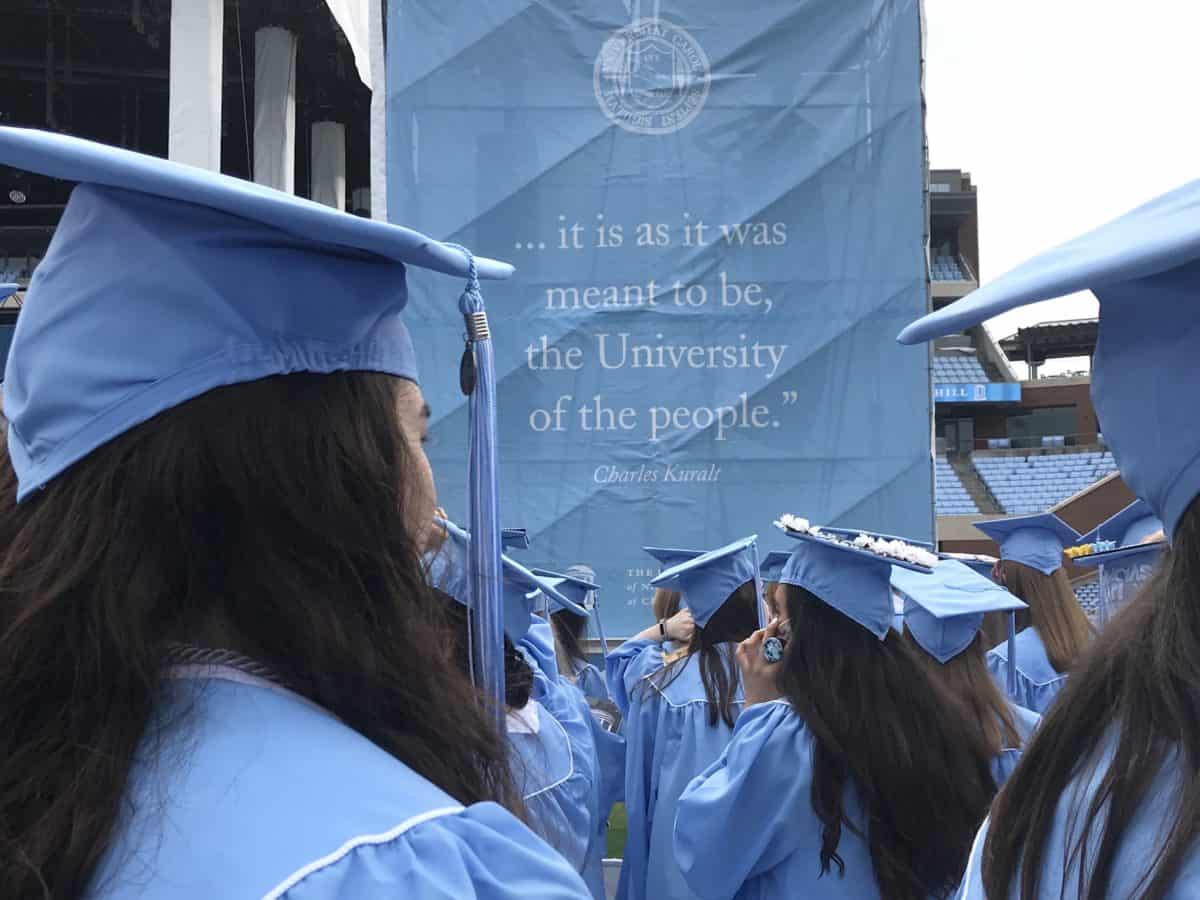

“So, you’re a first-generation college student, right?”
Numerous scenes of my stepdad receiving certificates and awards danced around in my head. Not for academic accomplishments, but for his innovative and successful farming techniques. I had always been impressed by his work ethic. A knot began to form in my stomach as I wondered if it would be silly to bring up such achievements to a person who has a master’s degree.
“You are not a continuing-education student, is that correct?”
It was not that I’d missed the question the first time; it was just that I did not quite fully understand what my high school guidance counselor was asking me. I thought back to the many late nights I’d seen my mom shuffle inside from a long day of working at the drugstore. She’d intently lie out her nursing books, needlessly-full pencil pouch, and one of those lined, canary-yellow legal pads. After plugging in her laptop and grabbing a Diet Mountain Dew from the fridge, her stake-out would begin. She would sit for hours upon hours, studying and taking quizzes and making flashcards.
The knot in my stomach had evaporated; I sat upright and smiled widely. Unable to hide the pride in my voice, I finally responded, “Well, my mom is a registered nurse! She just finished getting her degree from our local community college last year.” Now it was difficult to distinguish the look on her face. Confusion? Understanding? She smiled and her eyes softened as she pulled a Carolina blue folder from her desk, sliding it towards me. I read the words on the folder aloud: “Carolina Firsts.” Sounded a bit pretentious to me.
What I could not know then was that this term was created to help define the unique struggles I would face during my time as a first-generation college student. Being a “Carolina First” would eventually become an honorable signifier — one I now use to represent what I have accomplished — but at this particular moment, I was offended by the label and could not understand why I needed to be categorized in the first place. As quickly as it had vanished, the pit in my stomach had knotted again, this time full of butterflies. Let me clarify: these are not the romantic butterflies that gently flutter around inside of you, making you feel giddy or smiley. Oh, no — this was a swarm of anxiety-filled, guilt-ridden insects that manically swirled about causing nausea and a sort of nervous discomfort.
I glanced back up to meet the gaze of my guidance counselor. Her cheery smile had vanished; she was quickly shuffling through paperwork and pulling up tabs on her computer. She proceeded to explain that while there can be a range of definitions regarding the term “first-generation college student,” UNC-Chapel Hill, like many other universities, considers a first-gen student to be one whose parents do not have a bachelor’s degree. Reflecting for a moment, I recognized that not only had neither of my parents obtained a bachelor’s degree, but no one in my extended family had a degree from a four-year university, either. Of course, I did not share this realization with my advisor. I could tell by her tone that being first-gen was supposed to be a description that made me proud, but really, it just intensified the embarrassment I was feeling over something I could not control.
How could I tell my mom, who had worked so hard to obtain an associate degree, that her great efforts and success in going to school while working and raising a family were not enough to set me apart from what I perceived to be an offensive category? My mom had been the most passionate and the only active supporter of my goal to attend Carolina. Surely she would see this label as one of achievement and not degradation. But would I ever be able to see it that way? Hiding the shame I associated with being a first-gen student eventually led to a guilt I could not shake. I was worried that I would appear ungrateful and unappreciative of the sacrifices she had made for me to even be able to pursue college in the first place.
As you might imagine, the process of preparing for my first semester of college was a lonely one. During my last summer at home, I was beyond frustrated with the lack of guidance I received while filling out the financial and administrative forms necessary to solidify my spot as a member of the UNC Class of 2019. I was jealous of my friends whose parents were helping them navigate orientation packets, pick out classes, and decide where to live. My stepdad would rarely speak with me about my future endeavors at UNC because he saw anything other than community college as a waste of money and time. Though she had always vehemently supported my goal to attend a four-year university, my mom had never even heard of FAFSA. And once we realized what it was and how it worked, I had missed some important deadlines that affected how much financial aid I would receive for the first year of college.
But I am resourceful and I am resilient. By the end of my time at UNC, like many others, I had learned how to properly balance school, work, and social life. Against the odds, I was able to meet the academic demands of an institution such as UNC, graduating in the expected four years with two majors and a minor. Still, being the first person in my family to take this educational route meant there would be roadblocks that I could not foresee.
During my first few semesters, I learned how to traverse the unfamiliar jargon of professors and educated myself on the financial avenues available to me to help pay for my schooling. Yet I was constantly running into fees for things that neither myself nor my mom had anticipated. Are you a commuter? Have an off-campus job? Need your car for any reason? That’ll be $150 per semester for one parking pass, please. And don’t forget the $30 charge to enroll in a fitness class, which every student must take before graduating. Forgot to mention the semesterly $300 dished out for textbooks, plus the occasional expenses for online codes! Getting a tutor was out of the question, and I remember being genuinely impressed by those who were able to afford Greek life, club sports, and other costly extracurriculars.
That first year I experienced a sort of socioeconomic shock, confused and frustrated by how expensive it was to not only go to college but to be in college. In addition to the financial strain and stress that these unexpected fees caused me, I began to experience some emotional turmoil as well. The same feeling of loneliness I had experienced the summer before college had crept back up and rooted inside of me. Watching others contact a mentor or older sibling to lean on for help highlighted how my college experience was one of exploration and growth that I had to navigate alone. There was no option to call a family member or trusted advisor to ask for guidance on which philosophy class to take to fulfill a certain credit, or to get advice on how to approach a TA about a grading question. Recognizing that I was not as well-equipped to excel as my continuing-generation peers was a hard pill to swallow, though accepting this truth was the first step I had to take towards my pride in identifying as a “Carolina First.”
On graduation day, our commencement speaker asked all “Carolina Firsts” to stand. Looking across the field on that sunny May day proved that despite how I had felt throughout the majority of college, I was not actually alone. There had been plenty of others who, like me, had specific needs and unique obstacles as first-gen students during their time at UNC. And they too, had successfully beaten the odds and become the first people in their families to obtain a four-year degree.
My time at UNC afforded me not only a rigorous and eye-opening academic education but also an opportunity to mature emotionally. Eventually, I was able to channel the confusion, shame, and guilt I had previously felt into a genuine gratitude for the uncommon opportunity to pursue higher education. Though this emotional shift was a gradual one, I now realize that being a first-generation college student is a respectable label and that using this term to define yourself is not meant as a slight towards those in your family who, for whatever reason, could not attend or finish schooling at a four-year university. It should instead be viewed as a symbol of hope, change, and growth for a family.
According to Donald Earl Collins, associate professor of history at the University of Maryland, University College, first-generation college students are “navigating a system that is not only new to them, but that taxes them experientially, psychologically, and emotionally.” By pioneering a new pathway that no person in my family had ever taken, I may have been able to change the course of my family’s future forever. Regardless, I can confidently say that for my children, pursuing higher education will be an expectation — not an exception.
Please consider that the statistics show that we, as first-generation college students, are:
More likely to attend a community college.
Less likely to graduate on time.
Earning less on average than our continuing-education counterparts.
Less likely to have a mentor.
More likely to need financial support.
More likely to choose a career that gives back to our communities.
Editor’s note: This perspective first appeared in The Issue. It has been republished with the author’s permission.




